Exclusive Q&A with Pirelli's Paul Hembery
After last year’s much-talked-about tyre dramas, the 2014 season and its far-reaching regulation changes have presented Pirelli with a brand new challenge, as high-torque power units and reduced downforce have dramatically changed the demands an F1 car places on its rubber.
We caught up with Pirelli’s motorsport director Paul Hembery at this week’s Barcelona test to find out just how the Italian company have risen to that challenge…
Q: Paul, how is it to start a season without all the complaints and the media heat?
Paul Hembery: Ha, some people always try to complain of course, but yes, every year in Formula One is different and every year there is another ‘theme’ that carries through. Last year we were that theme, but this season so far we’ve had a really positive start. Coming into a season with very new cars - which of course has an impact on the tyres - we were very fortunate to test pre-season in locations which were able to give us strong information very early in the year on how the cars were working with the tyres - and that was a substantial step forward from the sports’ point of view.
At the first races we’ve seen a bit of a mix of weather conditions - actually we’ve seen a lot of rain, which was very good for us as we’ve brought a new rain tyre for this year and have been very happy to see in some of the qualifying sessions that there is a crossover point between what we call the intermediate tyre and the full rain tyre. Some cars have been out on one tyre, some on another, which meant that we’ve finally closed the gap between the two. In the past we maybe had a situation when there was a gap between when you could use one and the other, which made it very difficult for the teams. Now we have that closed.
In terms of the slick tyres, we have seen a good performance considering this very substantial change. Maybe sometimes we will see during the season - as the cars improve - that probably some of our choices are a bit conservative, because as they reduce the amount of wheel spin and the amount of sliding, that means that there is less problem from the tyre overheating - and maybe we have to review our choices for the season going forward once we understand the effects of the rate of development of the cars.
Q: Why is it so much easier this year than in 2013? Are the new cars easier to equip?
PH: We took a bit of a step back. We were very aggressive in previous seasons, not only to create a strong strategy challenge but also an engineering challenge for the teams. That worked for some - and maybe didn’t work for others. This year, having had a huge amount of unknowns about the season, we simply needed to take a bit of a step back.
Q: When did you start to work with the teams on 2014? Heading into such a ‘complicated’ season, you must need more cooperation from the teams…
PH: Well, we started getting data in June, July last year of how the cars would appear, so we got an idea of how the cars were handling. We knew very early on that there was a lot of wheel spin potential this year and that meant that we also knew with the lower downforce that the tyre would need to provide on one hand resistance to the wheel spin, but also try and provide a level of grip in terms of chemical grip - which comes from the compound - to compensate for the lack of downforce. That was the challenge. We managed to do some testing in December with some 2013 cars to compare last year’s product with this year’s product - that was very important for us. It meant that we actually understood the actual 2014 cars. We mainly have only three slick tread compounds for 19 different tracks - the super soft is really mainly for the few street circuits. Three compounds that have to cover 11 teams and 19 different circuits means that you could be a bit more compromised in extreme heat or cold - but that is the rule for everybody. Generally speaking they are all struggling - it’s not like one or two are really happy - and that is something that we remind everybody of: it’s the same challenge for everybody.
Q: Can you explain what the biggest differences are compared to previous seasons? Have Pirelli brought new technologies?
PH: We clearly had to change the product for this year because of these [regulation] changes. We would love to make some changes on the tyres as well, but we will hold that back for next season.
Q: In the last two years the tyres have been a decisive factor in the championship. Have you lost that ‘honour’ to the power unit this season?
PH: Yes, it should be the year of the power unit. The sport has made a substantial change and we are a partner in the sport. We’ve been asked to do a certain kind of job. It is quite right that there has been a major investment by the engine manufacturers into very interesting and relevant technologies and it is quite right that this year the focus is totally on that.
Q: Barcelona is usually the first benchmark of the season. Does that also go for the tyres?
PH: To a certain extent. It is a very historical test track - and a very good tyre test track for particularly the left front tyre, so under warm conditions it’s a tyre testing exercise that allows you to evaluate the improvements and the changes that you are making. It is also the first event where people have had a chance to understand their cars and make the first substantial changes of the season. It changes the tone of the next four to five races - and that also goes for the tyres. We have already seen today that teams are starting to work to maximize tyre performance. At the start of the season they clearly had other challenges. Now starts the detailed work with the teams that we’ve seen in previous years. My guess is that at the end of the season we will see cars lapping quicker than we have seen last year.
Q: Last season some teams suffered significantly more than others on the tyre side. Will we see that to some extent again?
PH: Maybe later on in the year. We are already seeing quite big gaps in pace and that tends to mean that people that push harder will always want a product that is, let’s say, more conservative so that they can maximize more their performance. Then you have the teams that don’t have that performance so they are pushing to have more performance from the tyre to close the gap to the other teams. So yes, you will see a bit of that - but we have only three compounds so in reality the options will be minor. My guess is that in 90 percent of cases people know what we are going to choose. There is maybe only one or two small selection decisions that you will have during the year.
Q: The two pre-season tests in the warmer climes of Bahrain - did they deliver what you were looking for?
PH: We’ve been very active in lobbying the teams and the FIA to have that opportunity. And it was worth it! It was a fantastic change. Barcelona is a great test track, but not in cold temperatures. To go to Bahrain, which is a traction circuit, for a tyre maker, with 40 degree track temperatures early in the season, meant that we already could establish where we were. So we would want to continue with this - probably evenly split between Abu Dhabi and Bahrain - to allow us to understand the compounds even better.
Q: Even when you have been under pressure, it always seems to be positive for Pirelli to be in F1 racing. What would make another good season this year?
PH: Ha, yes, bad news sells - sometimes! A good season would be if we deliver what we’re asked to deliver: two to three pit stops. We have managed that during previous seasons and we are in line to do this again. We want to make interesting races for the fans and we will always deliver what the customer wants. We are happy to be part of Formula One. It is a tremendous championship. It is a unique product. We have the best drivers in the world and we have fantastic new technology. We will be going to Russia this year - our major shareholder is Russia-based - so the Russian business is very important for us. So if the sport wants us we will be around!
Next Up
Related Articles
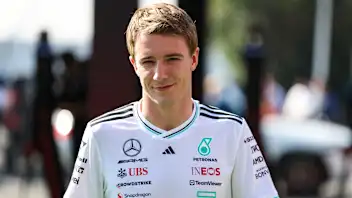 Vesti confirmed as Mercedes’ Third Driver in 2026
Vesti confirmed as Mercedes’ Third Driver in 2026.webp) Russell 'ready to fight for a World Championship'
Russell 'ready to fight for a World Championship'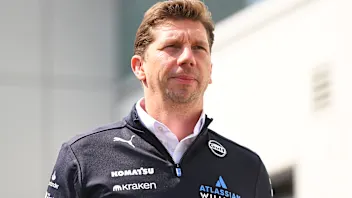 DRIVING TOMORROW: James Vowles on F1’s future
DRIVING TOMORROW: James Vowles on F1’s future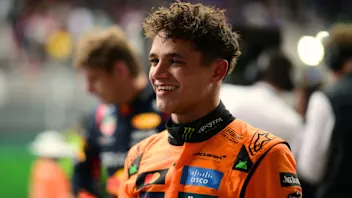 Norris admits he’s ‘still trying to accept’ champion status
Norris admits he’s ‘still trying to accept’ champion status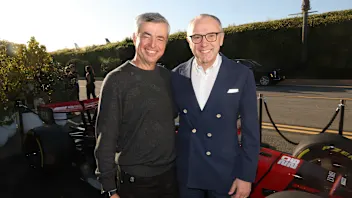 Stefano Domenicali attends Apple TV press day
Stefano Domenicali attends Apple TV press day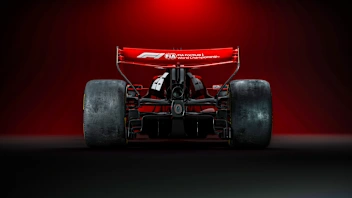 ExplainedAll you need to know about Advanced Sustainable Fuels
ExplainedAll you need to know about Advanced Sustainable Fuels